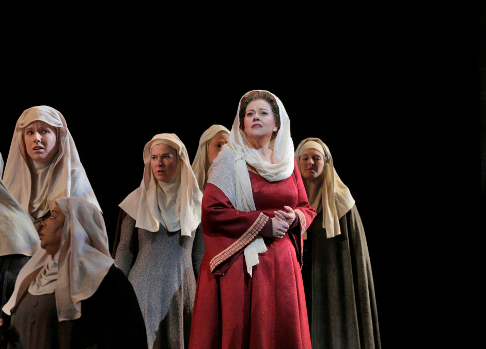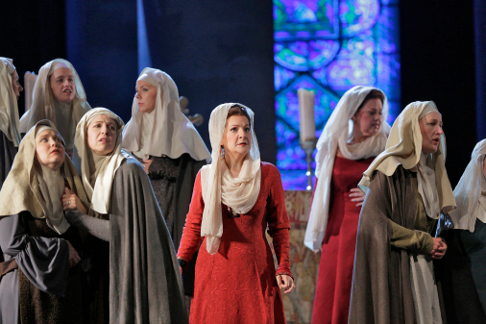![Susan Neves (in red) as the First Chorus [Photo by Ken Howard courtesy of San Diego Opera]](http://www.operatoday.com/MIC_0830a.png)
05 Apr 2013
Murder in the Cathedral at San Diego Opera
Italian composer Ildebrando Pizzetti (1880-1968) wrote more than fifteen operas, of which almost none are staged today.
English Touring Opera are delighted to announce a season of lyric monodramas to tour nationally from October to December. The season features music for solo singer and piano by Argento, Britten, Tippett and Shostakovich with a bold and inventive approach to making opera during social distancing.
This tenth of ten Live from London concerts was in fact a recorded live performance from California. It was no less enjoyable for that, and it was also uplifting to learn that this wasn’t in fact the ‘last’ LfL event that we will be able to enjoy, courtesy of VOCES8 and their fellow vocal ensembles (more below …).
Ever since Wigmore Hall announced their superb series of autumn concerts, all streamed live and available free of charge, I’d been looking forward to this song recital by Ian Bostridge and Imogen Cooper.
Although Stile Antico’s programme article for their Live from London recital introduced their selection from the many treasures of the English Renaissance in the context of the theological debates and upheavals of the Tudor and Elizabethan years, their performance was more evocative of private chamber music than of public liturgy.
Evidently, face masks don’t stifle appreciative “Bravo!”s. And, reducing audience numbers doesn’t lower the volume of such acclamations. For, the audience at Wigmore Hall gave soprano Elizabeth Llewellyn and pianist Simon Lepper a greatly deserved warm reception and hearty response following this lunchtime recital of late-Romantic song.
For this week’s Live from London vocal recital we moved from the home of VOCES8, St Anne and St Agnes in the City of London, to Kings Place, where The Sixteen - who have been associate artists at the venue for some time - presented a programme of music and words bound together by the theme of ‘reflection’.
'Such is your divine Disposation that both you excellently understand, and royally entertaine the Exercise of Musicke.’
‘And there was war in heaven: Michael and his angels fought against the dragon; and the dragon fought and his angels, And prevailed not; neither was their place found any more in heaven … that old serpent … Satan, which deceiveth the whole world: he was cast out into the earth, and his angels were cast out with him.’
There was never any doubt that the fifth of the twelve Met Stars Live in Concert broadcasts was going to be a palpably intense and vivid event, as well as a musically stunning and theatrically enervating experience.
‘Love’ was the theme for this Live from London performance by Apollo5. Given the complexity and diversity of that human emotion, and Apollo5’s reputation for versatility and diverse repertoire, ranging from Renaissance choral music to jazz, from contemporary classical works to popular song, it was no surprise that their programme spanned 500 years and several musical styles.
The Academy of St Martin in the Fields have titled their autumn series of eight concerts - which are taking place at 5pm and 7.30pm on two Saturdays each month at their home venue in Trafalgar Square, and being filmed for streaming the following Thursday - ‘re:connect’.
The London Symphony Orchestra opened their Autumn 2020 season with a homage to Oliver Knussen, who died at the age of 66 in July 2018. The programme traced a national musical lineage through the twentieth century, from Britten to Knussen, on to Mark-Anthony Turnage, and entwining the LSO and Rattle too.
With the Live from London digital vocal festival entering the second half of the series, the festival’s host, VOCES8, returned to their home at St Annes and St Agnes in the City of London to present a sequence of ‘Choral Dances’ - vocal music inspired by dance, embracing diverse genres from the Renaissance madrigal to swing jazz.
Just a few unison string wriggles from the opening of Mozart’s overture to Le nozze di Figaro are enough to make any opera-lover perch on the edge of their seat, in excited anticipation of the drama in music to come, so there could be no other curtain-raiser for this Gala Concert at the Royal Opera House, the latest instalment from ‘their House’ to ‘our houses’.
"Before the ending of the day, creator of all things, we pray that, with your accustomed mercy, you may watch over us."
The doors at The Metropolitan Opera will not open to live audiences until 2021 at the earliest, and the likelihood of normal operatic life resuming in cities around the world looks but a distant dream at present. But, while we may not be invited from our homes into the opera house for some time yet, with its free daily screenings of past productions and its pay-per-view Met Stars Live in Concert series, the Met continues to bring opera into our homes.
Music-making at this year’s Grange Festival Opera may have fallen silent in June and July, but the country house and extensive grounds of The Grange provided an ideal setting for a weekend of twelve specially conceived ‘promenade’ performances encompassing music and dance.
There’s a “slide of harmony” and “all the bones leave your body at that moment and you collapse to the floor, it’s so extraordinary.”
“Music for a while, shall all your cares beguile.”
The hum of bees rising from myriad scented blooms; gentle strains of birdsong; the cheerful chatter of picnickers beside a still lake; decorous thwacks of leather on willow; song and music floating through the warm evening air.
![Susan Neves (in red) as the First Chorus [Photo by Ken Howard courtesy of San Diego Opera]](http://www.operatoday.com/MIC_0830a.png)
Italian composer Ildebrando Pizzetti (1880-1968) wrote more than fifteen operas, of which almost none are staged today.
A member of the same generation as Ottorino Respighi and Gian Francesco Malipiero, he started out to be a playwright and had two works staged before he entered the conservatory of his native Parma to study music. Some years later, Pizzetti was a conservatory teacher and administrator, first in Florence and then in Milan. In 1936 he succeeded Respighi at the Academy of St. Cecilia in Rome where his students included Mario Castelnuovo-Tedesco. Pizzetti was influenced by poet and playwright Gabriele d'Annunzio and he wrote incidental music for several of the latter’s plays. In 1939 Pizzetti was named to the Italian Royal Academy. Although his relations with the fascist government of Italy were occasionally stormy, they were often positive, and that may be one reason why his works have seldom been produced since then.
He composed his first opera, Sabina, in 1897. Between then and the premiere of Murder in the Cathedral (Assassinio nella Cattedrale) on March 1, 1958, he completed eleven others. Murder in the Cathedral is two-act opera with a libretto by the composer based on Alberto Castelli’s Italian translation of T.S. Eliot's play of the same name. It deals with the killing of Archbishop of Canterbury Thomas Becket by followers of King Henry II in the twelfth century. Henry is supposed to have asked if no one would rid him of the troublesome priest. That may have been all that was necessary for his followers to assume they had reason to murder Becket.
On April 2, 2013, San Diego Opera staged Pizzetti’s Murder in the Cathedral with leading Italian bass Ferruccio Furlanetto in the title role. General and Artistic Director Ian D. Campbell staged the work in a straightforward manner that made the story easy to grasp. Ralph Funicello’s unit set, consisting of bright colored stained glass windows with steps and platforms, looked like the inside of a great cathedral. Lighting was a large part of the décor and Alan Burrett’s designs were most effective. Costume designer Denitza Bliznakova dressed the Archbishop in the timeless robes of the Catholic Church, the First and Second Chorus soloists in crimson, and the remaining choristers in the muted colors of twelfth century England.
 Susan Neves (in red) as the First Chorus
Susan Neves (in red) as the First Chorus
The story of this opera, the conflict between Church and state, seems to have gone on forever. I was reminded of the murder of Martin Luther King so many centuries later. Like Becket, King knew that it could happen. Italian bass Ferruccio Furlanetto excels in the interpretation of roles on both sides of this conflict: Philip II in Don Carlo and Becket. Murder in the Cathedral is a thinking person’s opera. Furlanetto is in the prime of his career and his opulent voice flowed over the orchestra and into the auditorium like a magnificent force of nature. This is an opera he was born to sing. He is also a fine actor and when he was on stage you could not take your eyes off him.
Susan Neves and Helene Schneiderman sang the First and Second Chorus who commented on action. Since there was no love interest, their parts were much smaller than that of the Archbishop, but both sang with ringing tones. The other star of this performance was the San Diego Opera Chorus led by Charles F. Prestinari. Their harmonies were strong and they coalesced as a group. They really did not get to act as individuals because they were a unified congregation. For the finale they were joined by the excellent Children’s Chorus fro St. Paul’s Cathedral.
 Helene Schneiderman as the Second Chorus with Susan Neves as the First Chorus in the background
Helene Schneiderman as the Second Chorus with Susan Neves as the First Chorus in the background
Alan Glassman was the trumpet voiced Herald who announced each arrival. His presence in the part was true luxury casting. The other roles were actually parts of trios or quartets. The three priests who sang with dramatics tones as they tried to protect their Archbishop were tenor Greg Fedderly, bass-baritone Kristopher Irmiter, and bass Gregory Reinhart. The four tempters were also the four knights who eventually killed Becket. Tenor Joel Sorenson had a high lying difficult part but acquitted it with finesse. Baritone Malcolm MacKenzie, the smooth voiced Count Di Luna of the AZ Opera Il Trovatore, was a dramatic Second Knight, while bass-baritone Ashraf Sewailam and bass Kevin Langan, the sonorous Third and Fourth Knights, were properly villainous thugs.
Conductor Donato Renetti made a very auspicious San Diego Opera debut with this performance. The large orchestra responded with precise playing of this new and interestingly orchestrated score. I hope we will hear a great deal more from Renzetti.
Special kudos go to English Hornist Andrea Overturf for his beautiful phrasing. This was a spectacular evening at San Diego Opera and I hope this fine opera will be heard more often from now on.
Maria Nockin